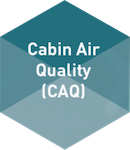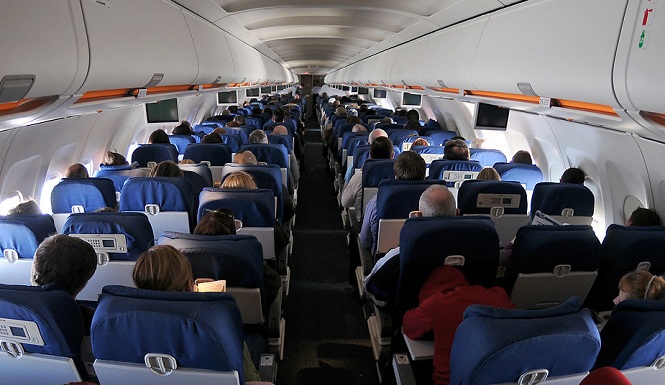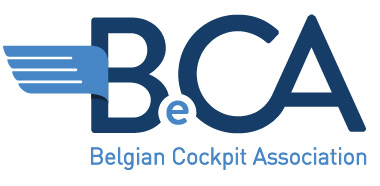Cabin Air Quality (CAQ)
 | What? | Aerotoxic syndrome: health issues caused by contaminated cabin air. Exposure can be acute (fumes incident) or chronic (small doses over extended periods). Due to possible high liability claims, the aviation industry (manufacturers & airlines) block investigative studies. |
Why? | Because pilots are directly exposed to contaminated cabin air, this is an immediate threat to their health. | |
How? | BeCA adheres to the precautionary principle (i.e. assume that there is a real threat to flight crew’s health). We call upon authorities and academics to conduct objective, peer-reviewed studies with adequate funding. A first step is the implementation of a standardised post-incident medical protocol. |
 Most modern passenger aircraft are equipped with pressurised, climate controlled, cabins. In spite of the aircraft designers’ intentions, unwanted fumes frequently permeate the interior of the aircraft. Open doors and hatches, as well as certain on-board sources, can introduce fumes to the cabin environment. However, the usual path of entry for fumes is via the aircraft pressurisation and climate control systems. The majority of passenger aircraft utilise bleed air from the engine compressor or from the APU to pressurize and heat or cool the aircraft cabin. As a consequence, any contaminants introduced into the compressor at the point from which the bleed air is extracted may result in fumes in the cabin.
Most modern passenger aircraft are equipped with pressurised, climate controlled, cabins. In spite of the aircraft designers’ intentions, unwanted fumes frequently permeate the interior of the aircraft. Open doors and hatches, as well as certain on-board sources, can introduce fumes to the cabin environment. However, the usual path of entry for fumes is via the aircraft pressurisation and climate control systems. The majority of passenger aircraft utilise bleed air from the engine compressor or from the APU to pressurize and heat or cool the aircraft cabin. As a consequence, any contaminants introduced into the compressor at the point from which the bleed air is extracted may result in fumes in the cabin.
For more than twenty years, concerns have been expressed about a possible relationship between exposure to fumes from a heated engine and hydraulic oils contaminating air drawn into aircraft air conditioning systems in certain types of aircraft, and post-exposure acute and chronic symptoms experienced by cabin occupants. Most reports involve aircrew – both pilots and flight attendants. The term ‘Aerotoxic Syndrome’ has been used by some to describe the symptoms experienced, although this term is not (yet) accepted as a recognised medical diagnosis. Although a number of inquiries have been undertaken, the results have been indeterminate, due in part to the difficulty in finding satisfactory evidence.
{youtube}sXf7MvI-nhU{/youtube}
The Dutch Public Broadcasting Organisation (NPO) created a 4-part documentary on this topic (Dutch only):
- Episode 1: Gif in de cockpit (2010)
- Episode 2: Gif in de cockpit II (2013)
- Episode 3: Gif in de cockpit – Het zwijgcontract (2017)
- Episode 4: Gif in de cockpit – De belangen (2017)
The BBC just recently dedicated an episode of its renowned “Panorama” to the subject:
- BBC Panorama – Something In The Air
- BBC Business Insider: Aerotoxicity: the hidden dangers of flying (2019)
Reporting is key!
If you experience Cabin Air Quality event, you MUST report it. EU Regulation 2015/1018 clearly states that “Any burning, melting, smoke, fumes, arcing, overheating, fire or explosion” and “Contaminated air in the cockpit or in the passenger compartment which has or could have endangered the aircraft, its occupants or any other person” shall be the subject of Mandatory Occurrence Reporting within 72h after the event. Please refer to OM-A Part A Chapter 11 which explains your company’s reporting procedure. Most likely this will include a dedicated form which can be used for finding the cause of the contamination. If your company has no specific form, consider using the ICAO form. Keep in mind that if you do not report, this is not only illegal, but no action will be taken to investigate and resolve the issue.
{vimeo}242440764{/vimeo}
Additional information
There is a vast amount of documentation available on Cabin Air Quality. Below you find some useful links containing verified information on the subject.
- ECA Guidelines on smoke & fume/smell events (or ECA website)
Practical guidance for air crew, put together by the European Cockpit Association. For pilots, by pilots. - ICAO Circular 344-AN/202 – Guidelines on Education, Training and Reporting Practices related to Fume Events
Extensive guidance for all aviation personnel (pilots, cabin, mx) also contains the standard ICAO form for reporting CAQ events - IATA Guidance for airline health and safety staff on the medical response to Cabin Air Quality Events
Airline best practices, including flowcharts and a limited list of CAQ studies - IATA Cabin Air Quality Event – FAQs
Frequently Asked Questions on CAQ from an airline perspective - GCAQE Contaminated Air Overview
Detailed introduction to CAQ from the Global Cabin Air Quality Executive: history, chemistry, developments (2015)
What does BeCA do?
BeCA has been very active on this topic. Since 2014 we participate in the CEN (European Committee for Standardisation) working group, which aims to create a European norm on cabin air contamination. We also chair the Cabin Air Quality (CAQ) working group of the European Cockpit Association (ECA) and we are a member of the GCAQE (Global Cabin Air Quality Executive). Furthermore, we have been very active at both the political and operational level to push for a standardised medical protocol.
Since these topics are currently under scrutiny by both German and UK National Authorities we maintain close ties with our sister organisations Vereinigung Cockpit (VC) and BALPA in order to provide our members with the latest updates. If you want to share your experience on this topic, please contact us.
Article Library
![]()

